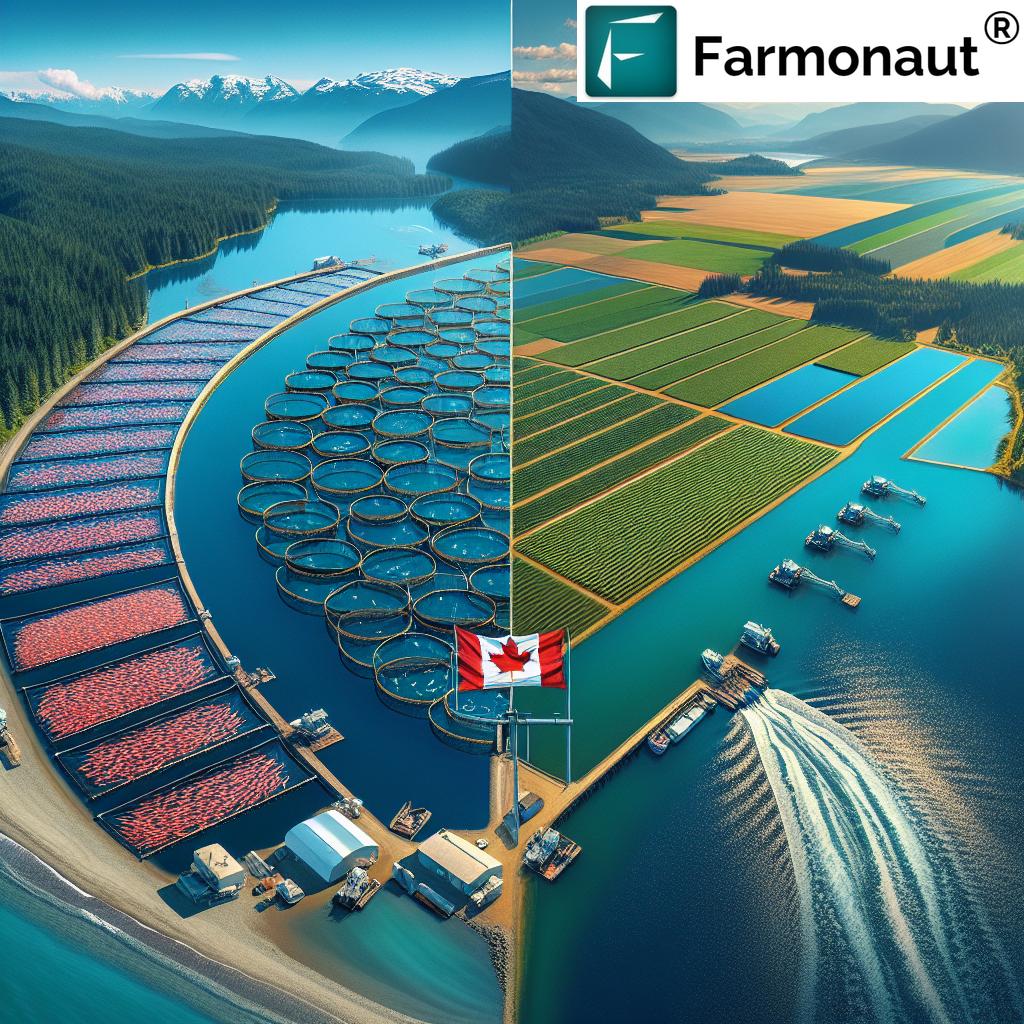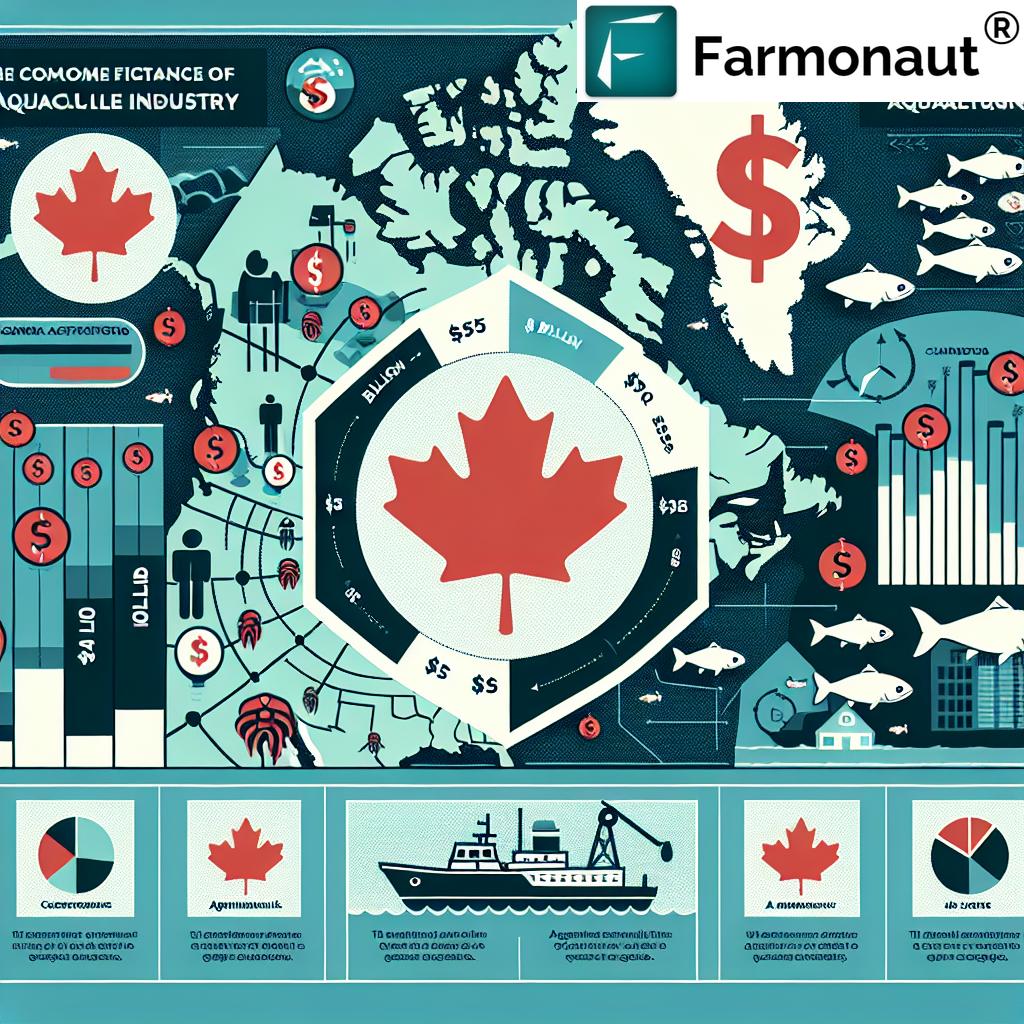Revolutionizing Canada’s Aquaculture: Powerful Push to Integrate Seafood Farming into Agriculture for Sustainable Food Security
In a bold move set to reshape Canada’s food production landscape, the Canadian aquaculture industry is making waves with a call for major reforms. The push for integration of seafood farming into the broader agricultural sector marks a significant shift in how the nation approaches food security and sustainable aquaculture.

The Call for Change: Aquaculture as Agriculture
Joel Richardson, the newly elected Board Chair of the Canadian Aquaculture Industry Alliance (CAIA), has issued a compelling statement that’s sending ripples through the seafood farming sector. “Aquaculture is agriculture,” Richardson declared, emphasizing the need for the federal government to bring aquaculture growth and development under the umbrella of Agriculture and Agri-Food Canada.
This call for Canadian aquaculture integration into the broader agricultural framework is not just a matter of semantics. It represents a fundamental shift in how the nation views and manages its food production systems. The move, if implemented, would “legitimize the sector’s rightful place as a major farming contributor to the nation’s food security,” according to Richardson.
Current Challenges in Aquaculture Management
At present, the Canadian aquaculture industry faces a unique set of challenges stemming from its regulatory framework. Fisheries and Oceans Canada (DFO) currently serves as the lead federal regulator, managing aquaculture under the Fisheries Act. However, this legislation was primarily designed for wild capture fisheries and fails to address the specific needs and contexts of aquaculture management.
- Outdated legislation not tailored for aquaculture
- Lack of modern national legislation for sustainable aquaculture
- Regulatory hurdles hindering industry growth
Canada stands out as the world’s only major farmed seafood producing country without modern national legislation specifically designed to govern a responsible and sustainable aquaculture industry. This regulatory gap has led to calls for comprehensive Canadian aquaculture legislation that addresses the unique needs of the sector.
The Economic Impact of Aquaculture in Canada
The significance of the seafood farming sector to Canada’s economy cannot be overstated. Richardson highlights that “Canada’s aquaculture sector generates nearly $5 billion in economic activity, employs thousands of people, and is a vital social driver in coastal, rural and Indigenous communities.”
Given its substantial contribution to the economy and its role in ensuring food security in Canada, proponents argue that aquaculture deserves recognition and support on par with traditional agricultural sectors. The current regulatory structure, they contend, is directly contributing to the sector’s stagnation, limiting its potential for growth and innovation.

The Push for Sustainable Seafood Farming in Canada
As the global demand for seafood continues to rise, sustainable seafood farming Canada initiatives are gaining prominence. The integration of aquaculture into the broader agricultural framework is seen as a crucial step towards achieving this sustainability goal. By recognizing aquaculture as agriculture Canada can potentially unlock new resources and support mechanisms for the industry.
Sustainable aquaculture practices can help reduce pressure on wild fish stocks while meeting the growing demand for seafood. This aligns with Canada’s commitment to sustainable development and responsible resource management. Farmonaut’s satellite-based monitoring solutions can play a crucial role in supporting sustainable aquaculture practices by providing real-time data on water quality and environmental conditions.
Challenges in British Columbia’s Salmon Farming Industry
The call for aquaculture reform comes at a critical time for the industry, particularly in British Columbia. The Federal Liberal government is currently advancing a transition plan for ocean-based salmon farms in B.C., a move that has sparked controversy and concern within the sector.
Richardson expressed his disapproval of the government’s approach, stating, “The Federal Liberal Government’s poor handling of aquaculture on the coast of BC has resulted in job insecurity, lost investment opportunity and major socio-economic impacts on hard working Canadians.”
The salmon farming BC transition plan has become a flashpoint in the broader debate about the future of aquaculture in Canada. Critics argue that the plan, which aims to phase out certain salmon farming operations, disregards scientific evidence and yields to activist pressures rather than balancing environmental concerns with economic realities.
The Role of Industry Leaders in Shaping the Future
As the debate over the future of Canadian aquaculture intensifies, industry leaders are playing a crucial role in advocating for change. Joel Richardson, with his extensive government and business background, brings a wealth of experience to his new position as chair of CAIA.
Richardson’s role as Vice President of Public Relations at Cooke Aquaculture Inc., a family-owned company based in New Brunswick, gives him unique insights into the challenges and opportunities facing the industry. His commitment to sustainable seafood production and wild salmon conservation underscores the industry’s recognition of the need to balance economic growth with environmental stewardship.
The Path Forward: Integrating Aquaculture into Agriculture
The push to integrate aquaculture into Agriculture and Agri-Food Canada represents a significant shift in how Canada approaches food production and security. Proponents argue that this move would:
- Streamline regulations and reduce bureaucratic hurdles
- Increase access to resources and support for aquaculture businesses
- Enhance Canada’s ability to meet growing global demand for seafood
- Promote innovation and sustainable practices in the sector
By recognizing aquaculture as a form of agriculture, Canada could potentially unlock new avenues for growth and development in the sector. This could lead to increased investment, job creation, and technological advancements in sustainable seafood production.
The Role of Technology in Modern Aquaculture
As the aquaculture industry evolves, technology is playing an increasingly important role in ensuring sustainability and efficiency. Farmonaut’s API offers cutting-edge solutions for monitoring and managing aquaculture operations. From water quality assessment to environmental impact tracking, these tools can help aquaculture businesses optimize their practices and meet regulatory requirements.
For those interested in leveraging these technologies, Farmonaut’s API Developer Docs provide comprehensive information on integrating these solutions into existing systems.
Conclusion: A Turning Point for Canadian Aquaculture
The call to integrate seafood farming into Canada’s agricultural framework marks a potential turning point for the nation’s aquaculture industry. As discussions continue and policymakers weigh the pros and cons of this proposed shift, the future of food security aquaculture Canada hangs in the balance.
With economic, environmental, and social factors all at play, the decisions made in the coming months and years will shape the trajectory of Canadian aquaculture for decades to come. As the industry pushes for recognition and support, it’s clear that the conversation around sustainable seafood production in Canada is far from over.
For those looking to stay informed and engaged with the latest developments in agriculture and aquaculture technology, Farmonaut offers a range of tools and resources:
As Canada navigates this pivotal moment in its aquaculture history, the integration of innovative technologies and sustainable practices will be key to ensuring a thriving and responsible seafood farming sector for generations to come.


